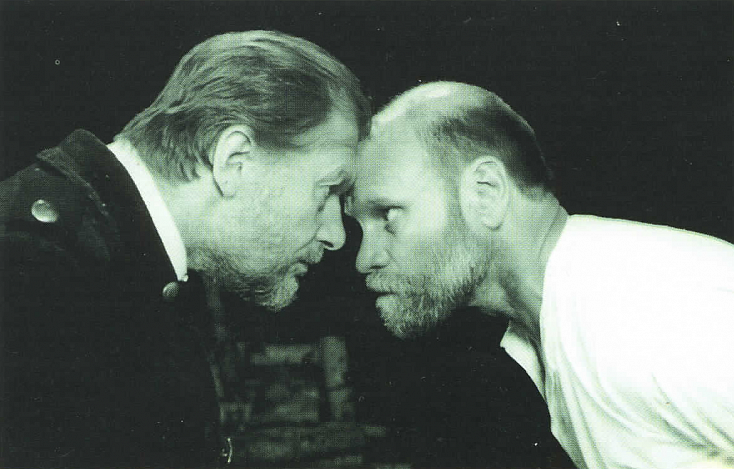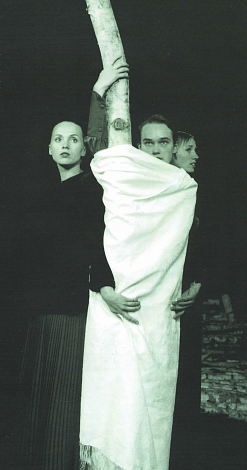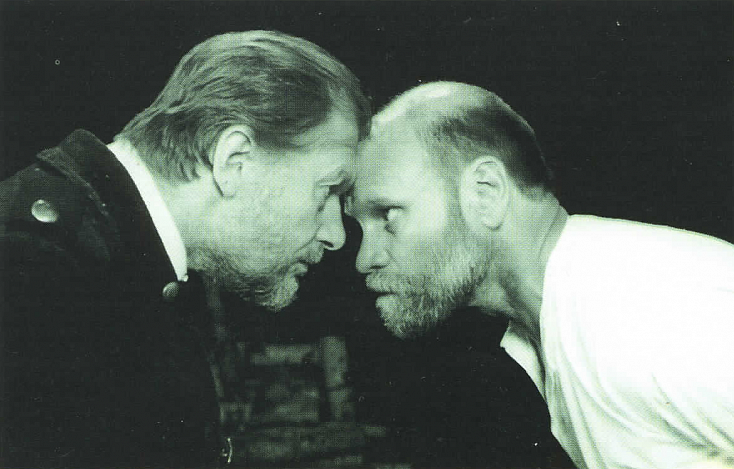| Directed: | by Eimuntas Nekrosius |
| Set design: | Nadezhda Gultiayeva |
| Music: | Faustas Latenas |
| Andrei Prozorov: | Andrius Bialobzeskis |
| Natalia Ivanovna: | Ausra Pukelyte |
| Olga: | Dalia Mikheleviciute |
| Masha: | Aldona Bendoriute |
| Irina: | Viktorija Kuodyte |
| Feodor Kulygin, school teacher, Masha's husband: | Vytautas Rumsas |
| Alexander Vershinin, lieutenant colonel, commander of battery: | Algirdas Latenas |
| Nikolai Tuzenbach, baron, lieutenant: | Vladas Bagdonas |
| Ivan Chebutykin, military surgeon: | Kostas Smoriginos |
| Alexei Petrovich Fedotik,2nd lieutenant: | Tauras Cizas |
| Ferapont, guard, an old man: | Laimonas Noreika |


Nekrosius and composer Faustus Latenas created not only the musical texture, but also the atmospheric score that speaks more directly, more definitely and more simply than words. Indeed, words are seldom used to speak about such things. Coherent speech would be a deception. Mournful, monotonous, muffled chords of the percussions, distant howling of dogs, piercing shrill of the fire alarm can say more...
Masculine strength, sweat, cigarette smoke, thumping of boots acquire almost mystical power... It is the unique case when the uninterrupted conflict of Chekhov's drama is frozen in front of us. This uninterrupted conflict has been much talked about by scholars, but in the scenic practice almost invariably substituted by clashes of characters, culmination, denouement and other elements of the pre-Chekhovian theatre.
Masculine strength, sweat, cigarette smoke, thumping of boots acquire almost mystical power... It is the unique case when the uninterrupted conflict of Chekhov's drama is frozen in front of us. This uninterrupted conflict has been much talked about by scholars, but in the scenic practice almost invariably substituted by clashes of characters, culmination, denouement and other elements of the pre-Chekhovian theatre.
N. Pesochinski, Smena, St. Petersburg:
In contrast with the previous Chekhovian production (Uncle Vanya) in «Three Sisters» Nekrosius seems to be much less sensitive to the nuances of the text (although certain fragments are illuminated with extraordinary brightness). In this work Nekrosius is more coarse and more expressive. All girls in this cantonment regard all men as their fathers. Here the second metamorphosis within the style of Nekrosius manifests itself: silent concentration and laconic brevity give way to turbulence and expressivity of the scenic language. Women have occupied the domain of his visions.
In «Three Sisters» women start and win. In none of the productions of this Chekhov's play have the three sisters been so young, so playful, so abrupt, so boyish, so different and at the same time so surprisingly alike in their aspirations.
In «Three Sisters» women start and win. In none of the productions of this Chekhov's play have the three sisters been so young, so playful, so abrupt, so boyish, so different and at the same time so surprisingly alike in their aspirations.
A.Karas, The Moskow Observer:
Performance gallery
2 photo

